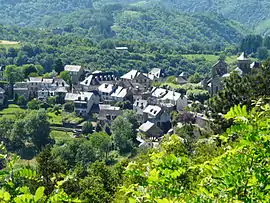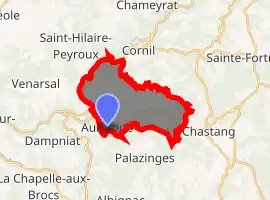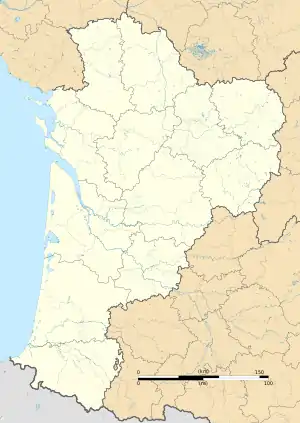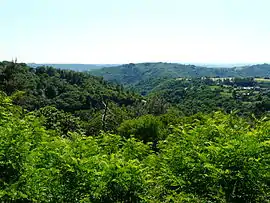Aubazines
Aubazines[2] (Occitan: Obasina), also spelled Aubazine, is a commune in the Corrèze department in the Nouvelle-Aquitaine region of central France.
Aubazines | |
|---|---|
 A general view of Aubazine | |
.svg.png.webp) Coat of arms | |
Location of Aubazines 
| |
 Aubazines  Aubazines | |
| Coordinates: 45°10′26″N 1°40′16″E | |
| Country | France |
| Region | Nouvelle-Aquitaine |
| Department | Corrèze |
| Arrondissement | Brive-la-Gaillarde |
| Canton | Midi Corrézien |
| Intercommunality | CC Midi Corrézien |
| Government | |
| • Mayor (2014–2020) | Jean-Pierre Chouzenoux |
| Area 1 | 14.07 km2 (5.43 sq mi) |
| Population (2017-01-01)[1] | 914 |
| • Density | 65/km2 (170/sq mi) |
| Time zone | UTC+01:00 (CET) |
| • Summer (DST) | UTC+02:00 (CEST) |
| INSEE/Postal code | 19013 /19190 |
| Elevation | 126–522 m (413–1,713 ft) (avg. 345 m or 1,132 ft) |
| 1 French Land Register data, which excludes lakes, ponds, glaciers > 1 km2 (0.386 sq mi or 247 acres) and river estuaries. | |
The inhabitants of the commune are known as Aubazinois or Aubazinoises.[3]
Geography

Aubazines is a commune in the Massif Central located some 10 km east by north-east of Brive-la-Gaillarde and 12 km south-west of Tulle. The D1089 highway passes through the north-west of the commune going from Malemort-sur-Corrèze to Tulle. However, access to the village is by the D130 branching off the D1089, going south to the village, and continuing south to Beynat. The D48 also goes east from the village to Le Chastang with the D48E branching off it in the east of the commune to go north to Cornil. The D14E1 also goes south-west from the village to join the D14.[4]
A railway line passes through the commune parallel to the D1089 and the station for Aubazines is at Gare d'Aubazine in the neighbouring commune Saint-Hilaire-Peyroux. The line is served by the TER Nouvelle-Aquitaine trains from Brive-la-Gaillarde to Clermont-Ferrand.
The village is in the south of the commune on a promontory overlooking the Coiroux at a height of over 150 metres. Apart from the village there are the hamlets of: Pauliac Bas, Pauliac Haut, Villieres, Vergonzac, Le Varachou, Rochesseux, Chastagnol, Quatre Routes, and Les Vayres. The commune is mixed forest and farmland.[4]
The Corrèze river forms the north-western border of the commune as it flows south-west to join the Vézère west of Breve-la-Gaillarde. A number of streams rise in the commune to join the Corrèze including the Ruisseau de la Geinde, 2.7 km long, which rises near Quatre-Routes and flows north to join the Ruisseau de Brauze in Cornil commune which flows to the Corrèze, the Ruisseau Français,[5] and the Canal des Moines which branches from the Coiroux.[4]
The lowest altitude of the commune is 126 metres in the west where the Corrèze leaves the commune. The highest points are 520 metres high on the Puy de Pauliac which dominates the area, and in the south-east next to Le Chastang near a place called la Jarouste.
Neighbouring communes and villages
History
The village of Aubazines, which had a church, became a commune in the French Revolution in 1790 through the dismantling of the parish of Cornil but it lacked Vital records until 1 March 1792.[6][7]
Aubazines, formerly written Obazine, has its origin in the foundation of a monastery by Étienne de Vielzot in the 12th century.[8][9] The monastery was affiliated shortly after to the Cistercian order. Very soon an associated convent of nuns was established in the village of Coyroux a few hundred metres away. The two monasteries existed until the Revolution. Formerly spelled Obazine the parish depended on Cornil.
The site of the monastic institutions and their dependencies have been the object of archaeological excavations and extensive studies in the last third of the 20th century under the direction of Professor of medieval history Bernadette Barrière.
Aubazine-Saint-Hilaire Railway Station
The village of Gare d'Aubazine, although located in the commune of Saint-Hilaire-Peyroux is an integral part of the history of Aubazines and of Dampniat than that of Saint-Hilaire.
The railway station was established at a place called Confolens however, as the station was primarily to serve Aubazines even though it was on the territory of the neighbouring commune, the council demanded a composite name. The railway acceded to the demand and the stop which was called Aubazine-Saint-Hilaire-Peyroux became Aubazine thereafter. Saint-Hilaire-Peyroux have their own stop at Pont Bonnel.
Before 1840, the date of the opening of Route nationale N89 (later D1089), there was nothing at the bottom of this valley other than the worn-out mills of: Confolens in Dampniat commune, Claredent in Aubazines commune, and Jayle in Malemort-sur-Corrèze commune, which were accessible only on narrow, bumpy, and steep slopes by goods wagons. Horses, mules, and donkeys circulated more often than carts.
The village, now called Gare d'Aubazine was rather poorly named. The SNCF station is located on the right bank of the Corrèze in the territory of Saint-Hilaire-Peyroux while the left bank belongs largely to Dampniat with the nearest village located 2 km away.
The Confolens bridge and paper mill added to progress together with the railway at the end of the 19th century and in 1912 the establishment of a railhead for the departmental tram line going to Turenne then Beaulieu-sur-Dordogne via Le Bosplos completed this action. The Tacot (Jalopy) had disappeared by 1932, replaced by a bus and the agglomeration of the Gare d'Aubazine retained its thriving business. New houses were built and a school with two classes was opened for the children. Their parents climbed to Dampniat to learn to read.
In June 1944 maquisards destroyed the Claredent railway bridge, blocking a German armoured train and preventing convoys of equipment from the manufacture of weapons at Tulle from being quickly transported to their destination on the front or the Rhine.
Heraldry
.svg.png.webp) Arms of Aubazines |
Blazon: Party per pale, at first Gules, a sun in his splendour of Or with two mullets the same all posed in pale; at second Azure a crescent moon of Argent with two mullets the same all posed in pale. |
Administration

.JPG.webp)
List of Successive Mayors[10]
| From | To | Name | Party | Position |
|---|---|---|---|---|
| 1799 | 1812 | Jean Leguerenne | ||
| 1817 | 1819 | Jean-Baptiste Dejouvenel | ||
| 1825 | 1825 | Pierre Brugeille | Farmer | |
| 1849 | 1852 | Aubin Pierre Louradour | ||
| 1853 | 1865 | Aimard Epiphane Louradour | ||
| 1870 | 1870 | Jean-Maxim Brugeille | Notary | |
| 1870 | Jean-Louis Auguste Lafon | |||
| 1874 | 1876 | Jean-Baptiste Lavergne | ||
| 1890 | 1944 | Jean-Baptiste Laumond | RS | Notary |
| 1893 | 1893 | François Firmin Delmas | Lawyer MP from 1928 to 1936 Magistrate of Andorra | |
| 1945 | 1959 | Raymond Bouillaguet | ||
| 1959 | 1977 | Emile Bouy | ||
| 1977 | 1995 | Léon Canard | ||
| 1995 | 2020 | Jean-Pierre Chouzenoux | PS |
Demography
In 2017 the commune had 914 inhabitants.
|
| ||||||||||||||||||||||||||||||||||||||||||||||||||||||||||||||||||||||||||||||||||||||||||||||||||||||||||||||||||
| Source: EHESS[11] and INSEE[12] | |||||||||||||||||||||||||||||||||||||||||||||||||||||||||||||||||||||||||||||||||||||||||||||||||||||||||||||||||||
Culture and heritage
Civil heritage
The commune has two structures that are registered as historical monuments:
- A Stone circle at Puy de Pauliac (Neolithic)
 [13]
[13] - The Canal des Moines (12th century)
 [14] with a length of 1.7 km, it was built to supply the village - it is the only canal of its kind still operating in Europe.[15] It dominates the Gorges of Coiroux.[16]
[14] with a length of 1.7 km, it was built to supply the village - it is the only canal of its kind still operating in Europe.[15] It dominates the Gorges of Coiroux.[16]
Other sites of interest are:
- The Dolmen of Rochesseux.
- The Saut de la bergère rock (overlooking the Canal des Moines), a 70m high cliff where, according to legend, a shepherdess was thrown from to escape dishonour.[17]
- The Tourist centre and Lake Coiroux.
 A Dovecote
A Dovecote Couroux Gorge
Couroux Gorge The Canal des Moines
The Canal des Moines.JPG.webp) The Canal des Moines
The Canal des Moines.JPG.webp) Lake Coiroux
Lake Coiroux
Religious heritage
Two religious buildings are registered as historical monuments and one more contains historical objects:
- Remains of the old Monastery of Coyroux (12th century).
 [18][19] It contains many items that are registered as historical objects:
[18][19] It contains many items that are registered as historical objects:
- The old Obazine Abbey or Abbey Saint-Etienne (1142)
 [24] and monastic buildings of the ancient Cistercian abbey founded in 1142 by Saint Etienne, the first abbot. The abbey contains many items registered as historical objects:
[24] and monastic buildings of the ancient Cistercian abbey founded in 1142 by Saint Etienne, the first abbot. The abbey contains many items registered as historical objects:
- Group sculpture: Saint Roch (18th century)
 [25]
[25] - Statuette: Virgin and child playing with a bird (15th century)
 [26]
[26] - Master Altar: Altar, seating, Tabernacle, Pedestal, Statue (18th century)
 [27]
[27] - 3 Stalls (17th century)
 [28]
[28] - Statue: Saint Etienne of Obazine (18th century)
 [29]
[29] - Group sculpture: Virgin of pity (15th century)
 [30]
[30] - Bas-relief: Saint Etienne Harding holding the habit of Saint Bernard of Clairvaux (17th century)
 [31]
[31] - Bas-relief: Saint Etienne Harding, Abbot of Citeaux, granting the Charter of charity (17th century)
 [32]
[32] - Cabinet (12th century)
 [33]
[33] - Altar Cross (13th century)
 [34]
[34] - 4 plates on a shrine (13th century)
 [35]
[35] - Reliquary Cross (19th century)
 [36]
[36] - Recumbent Statue: Saint Etienne of Obazine (13th century)
 [37]
[37] - Tomb of Etienne of Obazine (13th century)
 [38]
[38] - Total of 42 Stalls (17th century)
 [39][40][41][42][43][44][45][46][47][48][49]
[39][40][41][42][43][44][45][46][47][48][49] - Statue: Virgin (18th century)
 [50]
[50] - Pedestal (18th century)
 [51]
[51] - 2 Statuettes: Adoring angels (18th century)
 [52]
[52] - Tabernacle (18th century)
 [53]
[53] - 3 Statues: (1 large 2 small) Christ between 2 angels (18th century)
 [54]
[54] - Altar, seating, altar tomb, altar exhibits (18th century)
 [55]
[55] - 2 Bas-reliefs: Saint Etienne (17th century)
 [56]
[56] - Cabinet in the Sacristy (14th century)
 [57]
[57] - Bronze bell (1683)
 [58]
[58] - Little bell (1605)
 [59]
[59] - Bronze bell (1605)
 [60]
[60] - Reliquary Cross (double cross) (12th century)
 [61]
[61] - Monumental Painting: Virgin of pity (1466)
 [62]
[62] - 25 Stained glass windows (12th century)
 [63]
[63] - Group of Stalls (17th century)
 [64]
[64]
- Group sculpture: Saint Roch (18th century)
- The Parish Church of Notre-Dame contains three items registered as historical object:
 The Cistercian Abbey
The Cistercian Abbey Side view of the Abbey
Side view of the Abbey The Abbey lodging
The Abbey lodging Tomb of Saint Etienne
Tomb of Saint Etienne Some of the Stalls in the Abbey
Some of the Stalls in the Abbey One of the old Cabinets
One of the old Cabinets The transept in the Abbey
The transept in the Abbey Painting: Virgin of pity
Painting: Virgin of pity Altar in the Abbey
Altar in the Abbey The choir in the abbey
The choir in the abbey One of the Stained glass windows in the Abbey
One of the Stained glass windows in the Abbey
Notable people linked to the commune
- Étienne d'Obazine, founder of the Abbey.
- Pierre Brugeilles (1845-1893), born in Aubazines, Mayor of the commune, MP for Corrèze from 1885 to 1889.
- Jean-Baptiste Laumond (1865-1957), Mayor of the commune from 1890 to 1944, MP for Corrèze from 1926 to 1938, Magistrate of Andorra from 1937 to 1940.
- Coco Chanel (1883-1971), Hatmaker and clothes designer, spent part of her youth at the orphanage.[68] in the Abbey and managed by the nuns from Saint-Cœur de Marie.
- Bernadette Barrière (1936-2004), Professor of medieval history, University of Limoges.
- Étienne Jugie, born in Aubazines on 3 May 1878,[69] died at Sorgues on 29 November 1954, known in religion under the name Marin Jugie, (Augustinian of the Assumption) Theologian, author of numerous works, Professor at the Vatican and at Lyon. He worked on the Doctrine of the Assumption and on the Churches of the Orient, studied "Joseph de Maistre and the Greco-Russian Church".
- Thierry Chenavaud, designer and producer of shows since 2007, every year in July the "Cistercian Lights" with huge images at the old monastery of Coyroux at Aubazines. The narration of the show is extracted from the Life of Etienne d'Obazine text from the 12th century, written by a contemporary of Etienne.
Philately
A Postage stamp with a value of 1.25 francs depicting the Abbey of Aubazines was issued on 18 February 1978.[70]
See also
References
- "Populations légales 2017". INSEE. Retrieved 6 January 2020.
- Commune d'Aubazines (19013), commune actuelle, INSEE
- Inhabitants of Corrèze (in French)
- Google Maps
- See the Hydrography section (in French)
- Historic parish registers, Vital records, and decennial tables (in French)
- Life in Aubazines under Napoléon Archived 2013-10-15 at the Wayback Machine (in French)
- The village of Obazine, then Aubazines from the Latin Obazina ("thick forest") Archived 2013-10-15 at the Wayback Machine (in French)
- Étienne de Vielzot (in French)
- List of Mayors of France (in French)
- Des villages de Cassini aux communes d'aujourd'hui: Commune data sheet Aubazines, EHESS. (in French)
- Population en historique depuis 1968, INSEE
- Ministry of Culture, Mérimée PA00099660 Stone circle (in French)

- Ministry of Culture, Mérimée PA00099659 Canal des Moines (in French)
- Documentary Heritage passion: from Lot-et-Garonne to Corrèze, Marie Maurice and Franck Dhelens, transmission Des racines et des ailes, 13 April 2011 (in French)
- The Gorges of Coiroux Archived 2014-05-21 at the Wayback Machine (in French)
- Saut de la Bergère on the Aubazines website Archived 2008-11-13 at the Wayback Machine, consulted on 7 December 2009 (in French)
- Ministry of Culture, Mérimée PA00099661 Monastery of Coyroux (in French)
- Google Books: Father J. B. L. Roy de Pierrefitte, Historical studies on the monasteries of Limousin and la Marche, Volume 1, Guéret, 1857-1863 (in French)
- Ministry of Culture, Palissy PM19000026 Statue: Sainte Marie-Madeleine (in French)

- Ministry of Culture, Palissy PM19000025 Statue: Nicodème (in French)

- Ministry of Culture, Palissy PM19000024 Group sculpture: Virgin and Saint John (in French)

- Ministry of Culture, Palissy PM19000585 Group sculpture: Setting on a Tomb (in French)

- Ministry of Culture, Mérimée PA00099658 Abbey Saint-Etienne (in French)

- Ministry of Culture, Palissy PM19000836 Group Sculpture: Saint Roch (in French)

- Ministry of Culture, Palissy PM19000023 Statuette: Virgin and child playing with a bird (in French)

- Ministry of Culture, Palissy PM19000022 Master Altar: Altar, seating, Tabernacle, Pedestal, Statue (in French)

- Ministry of Culture, Palissy PM19000021 3 Stalls (in French)

- Ministry of Culture, Palissy PM19000020 Statue: Saint Etienne of Obazine (in French)

- Ministry of Culture, Palissy PM19000019 Group sculpture: Virgin of pity (in French)

- Ministry of Culture, Palissy PM19000018 Bas-relief: Saint Etienne Harding holding the habit of Saint Bernard of Clairvaux (in French)

- Ministry of Culture, Palissy PM19000017 Bas-relief: Saint Etienne Harding, Abbot of Citeaux, granting the Charter of charity (in French)

- Ministry of Culture, Palissy PM19000016 Cabinet (in French)

- Ministry of Culture, Palissy PM19000015 Altar Cross (in French)

- Ministry of Culture, Palissy PM19000014 4 plates on a shrine (in French)

- Ministry of Culture, Palissy PM19000013 Reliquary cross (in French)

- Ministry of Culture, Palissy PM19000617 Statue: Saint Etienne of Obazine (in French)

- Ministry of Culture, Palissy PM19000616 Statue: Saint Etienne of Obazine (in French)

- Ministry of Culture, Palissy PM19000598 2 Stalls (in French)

- Ministry of Culture, Palissy PM19000597 4 Stalls (in French)

- Ministry of Culture, Palissy PM19000596 4 Stalls (in French)

- Ministry of Culture, Palissy PM19000595 2 Stalls (in French)

- Ministry of Culture, Palissy PM19000594 6 Stalls (in French)

- Ministry of Culture, Palissy PM19000593 4 Stalls (in French)

- Ministry of Culture, Palissy PM19000592 4 Stalls (in French)

- Ministry of Culture, Palissy PM19000591 4 Stalls (in French)

- Ministry of Culture, Palissy PM19000590 4 Stalls (in French)

- Ministry of Culture, Palissy PM19000589 4 Stalls (in French)

- Ministry of Culture, Palissy PM19000588 4 Stalls (in French)

- Ministry of Culture, Palissy PM19000587 Statue: Virgin (in French)

- Ministry of Culture, Palissy PM19000583 Pedestal (in French)

- Ministry of Culture, Palissy PM19000582 Statuette: Adoring angels (in French)

- Ministry of Culture, Palissy PM19000581 Tabernacle (in French)

- Ministry of Culture, Palissy PM19000580 3 Statues: (1 large 2 small) Christ between 2 angels (in French)

- Ministry of Culture, Palissy PM19000579 Altar, seating, altar tomb, altar exhibits (in French)

- Ministry of Culture, Palissy PM19000578 2 Bas-reliefs: Saint Etienne (in French)

- Ministry of Culture, Palissy PM19000543 Cabinet in the Sacristy (in French)

- Ministry of Culture, Palissy PM19000515 Bronze bell (in French)

- Ministry of Culture, Palissy PM19000514 Little bell (in French)
- Ministry of Culture, Palissy PM19000513 Bronze bell (in French)

- Ministry of Culture, Palissy PM19000489 Reliquary Cross (double cross) (in French)

- Ministry of Culture, Palissy PM19000488 Monumental Painting: Virgin of pity) (in French)

- Ministry of Culture, Palissy PM19000487 25 Stained glass windows (in French)

- Ministry of Culture, Palissy PM19000486 Group of Stalls (in French)

- Ministry of Culture, Palissy PM19001177 Statue: Saint John the Baptist (in French)

- Ministry of Culture, Palissy PM19001176 Retable and Altar seating in the 2nd chapel in the south transept (in French)

- Ministry of Culture, Palissy PM19000835 Bas-relief: Arms of the Abbey of Aubazines (in French)

- Chanel, Martine Marcowith, Weekend.be (in French)
- Register of Births No. 6 of 1878 on page 595 on the Departmental Archives of Corrèze website (in French)
- Stamps of France 1978 (in French)
External links
- Official Aubazines website (in French)
- Tourist Office of Pays Aubazine-Beynat
- The Canal des Moines, the Puy de Pauliac, and Aubazines on the Dailymotion website (in French)
- Aubazines on Géoportail, National Geographic Institute (IGN) website (in French)
- Aubazine on the 1750 Cassini Map
| Wikimedia Commons has media related to Aubazines. |